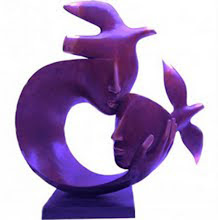‘Mourning Mothers Iran’ Stand with Activist Mothers Worldwide
Elahe Amani with Lys Anzia – Women News Network – WNN
A mother protecting her child isn’t anything unique. But in Iran, humanitarian activist mothers are now becoming global icons for human rights causes worldwide. In silent public protest, the ‘Mourning Mothers of Iran,’ known locally in Tehran as the ‘Mothers of Laleh,’ stand together each week, on Saturday evening vigils in Tehran’s Laleh Park.
“I urge all women around the world to show their solidarity with the Committee of Iranian Mothers in Mourning by assembling in parks, in their respective countries, every Saturday between the hours of 7 to 8 p.m., wearing black,” said Nobel Peace Prize Laureate, Shirin Ebadi, in a plea made to women and activists worldwide at a July 25 Iran pro-democracy rally in Amsterdam. Like the infamous “Women in Black,” and the ‘Madres de Plaza de Mayo,’ the Committee of Iranian Mothers use methods of ethics in non-violence to bring attention to the atrocity of their dead children.
Beginning in Jerusalem, in 1988, a group of almost 40 Israeli-Jewish women of conscience formed ‘The Women in Black.’ To make their point, they wore black clothing and stood silent in public protests. They protested against Israeli expansion into the West Bank and Gaza on the heels of the beginning of the 1987 Palestinian intifada. Soon Arab women from the northern region of Israel also joined the Women in Black. The message was a clear call for “Peace!” Opposing war, injustice, and militarism, Women in Black groups and their affiliates can be found in Iran, Australia, the UK, Serbia, Japan, South Africa, Italy, Spain, the Netherlands, Belgium, Canada, US, India, Nepal, Uruguay, Argentina and the Philippines, to name a few.
Outside of Jerusalem, 1988 was also a very dark period for Iranian history. In a few summer months, an enormity of crimes against humanity occurred as an overwhelming number of Iranian political prisoners were massacred. This left thousands of Iranian mothers devastated.
According to reports from Amnesty International, 4,500-10,000 Iranian political prisoners were declared killed or missing inside the country that year, over a period that lasted barely two months. After finding out about the death of their loved ones, the families of the victims were not allowed to receive the bodies of their dead. They were also not allowed to hold any funerals. Instead, the held bodies were dumped together in places like Khavaran or what the regime referred to as La’nat-Abad, ‘The Damned Place,’ a cemetery used for burying non-Muslims.
Mass burials at Khavaran were later accidentally discovered by an Armenian priest who had become curious as to why stray dogs kept digging for bones at, what was later determined the location of the mass graves. French-Iranian woman filmmaker, Mehrnoushe Solouki, was held in Evin Prison for nine months as she, too, stumbled on the discovery in 2007.
“The deliberate and systematic manner in which these extrajudicial executions took place may constitute a crime against humanity under international law,” said Human Rights Watch, in 2005. Perhaps of all the crimes against humanity in the last 30 years, the 1988 Iranian mass executions continue to be the most revealing indication of the regime’s contempt and fear of political dissidents.
“In the recent events, the government in Iran has been fabricating reports depicting an incorrect image of what has been going on in the country,” said Ebadi at the July 25, 2009 rally. “They do not want the people to know the truth.”
We may think this kind of protest is new in Iran, but Iranian mothers have always spoken out against violence, disappearance and the torture of their sons and daughters. Prior to the 1979 revolution, only two mothers’ organizations existed in the country. Both were affiliated with underground groups involved in struggles for democracy. They worked in opposition to the monarchy of the Shah’s regime, who’s policies had turned, at the end, to the jailing and torture of intellectuals, feminists, students, and labour union advocates.
“I need to tell my story. No one can stop me. No one!” said Parvin Fahimi, an active member of Mothers for Peace and the mother of slain 19 year old Iranian protester, Sohrab Arabi, said recently in July. “My son had been killed, but they refused to tell me,” she continued.


No comments:
Post a Comment